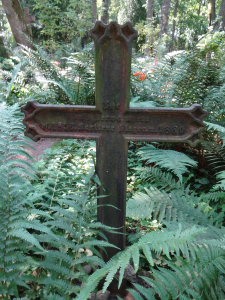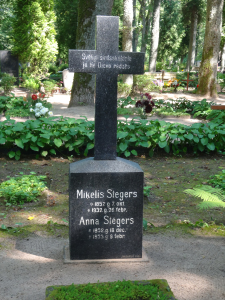Fifty-third installment from the diary of my great-grandfather’s sister Alise, written during the First World War. When the diary starts, she is living just a few miles from the front lines of the Eastern Front, and is then forced to flee with her husband and two young daughters to her family’s house near Limbaži as the war moves even closer. Her third child, a son, was born there in February 1916. The family has now relocated (again) to a home near Valmiera, and the Russian Revolution is in full swing. For more background, see here, and click on the tag “diary entries†to see all of the entries that I have posted.
If there is mention of a recognizable historical figure and event, I will provide a Wikipedia link so that you can read more about the events that Alise is describing.
December 31, 1917
We all sat together in the warm dining room of Savariņi, and thought about the past year. Many horrors, many pains, it brought us many indescribable things. Our land, our homeland is living through a huge and horrible tragedy. Not only the land but the people, suffering through everything the war has to throw at them. More than three years of war behind us, but the future is so foggy, that it is impossible to see what lies ahead.
The revolution is in full swing. More and more estates and their inventory are being confiscated. They are taking the last of what they can from the owners. Still the “Bolsheviks” promises are not being met – that has been the only happiness – one can hope and pray. Who will return what has been stolen? Who will fix the destroyed livelihoods? Now that is the life, that we must live!
Days are overcast – and the heart is longing for sun. There is no end to the tears, no end, they cry whether it is evening or morning, a mother cries at the side of a bed, the orphan cries waking up. There is no end to the tears, no end, they cry whether it is evening or morning, the hermit in the cave cries, as does the refugee wandering in foreign lands. We are its witnesses, and also its victims.
The most painful thing is that we are suffering from the hands of our own people, our own army. The same army, that should be protecting peaceful citizens, is the army that is stealing and destroying everything. Hayfields, gardens, homes, they are in such a state that it is as if the enemy has come marching through, leaving a trail of destruction. The heart is brave – but we feel powerless against the power of the thieves. If it would be possible, if there would be hope to get restitution from the taxation lists in some way, but it would not be the type of restitution with which one could save oneself from the destruction and famine.
This whole time we have been controlled by illusions. Political waves have stirred up into foam, on which people have died for slogans. All of the power to worker-soldier councils, and they promised us immediate peace, bread and land. How could we not want peace, after more than three years of spilled blood, for nothing. How could we not want bread, if there is no longer anything to eat? But it seems like none of these people have the ability to fulfill these promises, since they can’t even do it for themselves. The march of Titans goes on. Now the lives of people and the shadows of rulers are nothing. Famine destroys people’s minds and crushes them, like a ball of wax in a warm room. Lenin promises that wagons full of bread are ready, that peace is at the end of the rope… Who still has what? Mr Comrade, he breaks and steals. How many people have no eyes with which to cry, or painful sorrows due to famine. And it is true, there is not much more to take, only horrible crimes are left.


